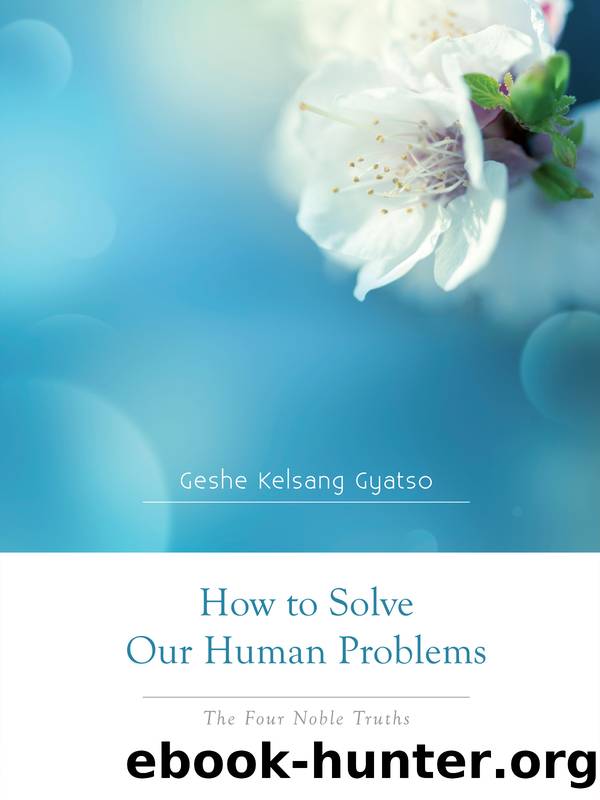How to Solve Our Human Problems by Geshe Kelsang Gyatso

Author:Geshe Kelsang Gyatso
Language: eng
Format: epub
Tags: Buddhism, Meditation, Mind Training, Lojong
Publisher: Tharpa Publications
Published: 2011-02-14T16:00:00+00:00
One of the most powerful techniques for developing and maintaining bodhichitta is the meditation known as âexchanging self with othersâ. There is no doubt that the Tathagatas â the compassionate Buddhas â have fully accomplished this exchange and, having abandoned all self-cherishing, cherish sentient beings more than themselves. Because all sentient beings are the object of Buddhaâs cherishing, they are precious. If the Buddhas with their perfect wisdom have seen that sentient beings are worthy of their infinite love and respect, then they are worthy of our respect too.
Anyone who practises the patience of non-retaliation when harmed, and who respects all sentient beings as if they were enlightened beings, pleases all the Buddhas and dispels the misery of the universe by attaining full enlightenment. For this reason, we should always practise patience.
What does it mean to show the same respect to sentient beings as we do to a Buddha? Clearly it would not be appropriate to make full-length prostrations in front of every person we meet. However, we can always respect them mentally, remembering that they are the objects of the Buddhasâ love and the cause of our attainment of enlightenment, and we can try to love them and fulfil their wishes. Moreover, all sentient beings have been our mother many times and have shown us untold kindness. All are therefore deserving of our gratitude, love, and patience.
If we remember the kindness of all sentient beings and try to please them whenever we can, we shall find happiness even in this lifetime. Others will respect us, our fame will spread widely, and we shall find abundant wealth and possessions. Eventually as a result of our virtuous actions we shall attain the supreme bliss of Buddhahood. Even if we do not attain Buddhahood in this life, wherever we are reborn in samsara we shall reap the benefits of practising patience. We shall have a beautiful body and be surrounded by a circle of devoted friends and students. We shall also have good health and a long life.
In conclusion, whenever we experience hardship, disturbances, or sickness, we should reflect on the faults of not accepting these and the benefits of being patient with our suffering. Then we should apply the appropriate opponent force by meditating on the patience of voluntarily accepting suffering. To improve and finally perfect our patience, we should meditate on Buddhaâs teachings on emptiness and the interdependence of all phenomena, and thus practise the patience of definitely thinking about Dharma. Whenever someone harms us, we should remember the many faults of anger and of displeasing sentient beings, and overcome these by relying upon the patience of not retaliating.
By sincerely practising these three types of patience, we shall extract the greatest possible meaning from our precious human rebirth and waste no more time binding ourself to samsara, the wheel of suffering and dissatisfaction. In these degenerate times, when the causes of suffering abound and it is rare for even a day to pass without our experiencing physical or mental problems, the practice of patience is of supreme importance.
Download
This site does not store any files on its server. We only index and link to content provided by other sites. Please contact the content providers to delete copyright contents if any and email us, we'll remove relevant links or contents immediately.
Periodization Training for Sports by Tudor Bompa(8273)
Bodyweight Strength Training by Jay Cardiello(7918)
Born to Run: by Christopher McDougall(7127)
Inner Engineering: A Yogi's Guide to Joy by Sadhguru(6796)
Asking the Right Questions: A Guide to Critical Thinking by M. Neil Browne & Stuart M. Keeley(5775)
The Fat Loss Plan by Joe Wicks(4921)
Bodyweight Strength Training Anatomy by Bret Contreras(4683)
Yoga Anatomy by Kaminoff Leslie(4364)
Dynamic Alignment Through Imagery by Eric Franklin(4217)
Science and Development of Muscle Hypertrophy by Brad Schoenfeld(4136)
Exercise Technique Manual for Resistance Training by National Strength & Conditioning Association(4071)
ACSM's Complete Guide to Fitness & Health by ACSM(4060)
The Four-Pack Revolution by Chael Sonnen & Ryan Parsons(3979)
Bodyweight Strength Training: 12 Weeks to Build Muscle and Burn Fat by Jay Cardiello(3971)
The Ultimate Bodybuilding Cookbook by Kendall Lou Schmidt(3945)
Yoga Anatomy by Leslie Kaminoff & Amy Matthews(3907)
American Kingpin by Nick Bilton(3887)
Nutrition for Sport, Exercise, and Health by Spano Marie & Kruskall Laura & Thomas D. Travis(3784)
Yoga Therapy by Mark Stephens(3749)
